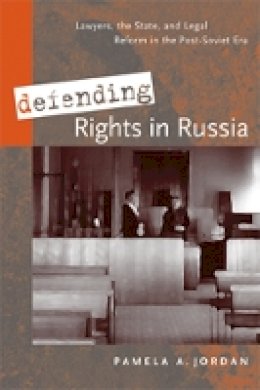
Defending Rights in Russia: Lawyers, the State, and Legal Reform in the Post-Soviet Era
Pamela Jordan
Lawyers often play pivotal roles in building democracies. PamelaJordan's engaging study of the Russian bar (advokatura) providesa richly textured portrait of how, after the USSR's collapse,practising lawyers called advocates began to assume new, self-definedroles as contributors to legal reform and defenders of rights inRussia.
Using the historical institutionalism approach as her analyticalframework and drawing from comparative literature on legal professions,Jordan argues that the post-Soviet advokatura as an institution gainedmore, although not complete, autonomy from the state as it struggled toredefine itself as a profession. Advocates formed new bar associationsand law offices and now have a broader range of ways to defendclients' rights than they did during the Soviet era. Jordansuggests that advocates' work is supporting the growth of civilsociety and the strengthening of human rights in Russia.
Jordan concludes that, in a measured way, advocates redistributedsocial and political power by means of their role as intermediaryactors between state and societal forces. However, she also warns thatsuch gains could be reversed if the Putin regime continues to flout dueprocess rights.
Product Details
About Pamela Jordan
Reviews for Defending Rights in Russia: Lawyers, the State, and Legal Reform in the Post-Soviet Era
until Jordan's efficient account. - Robert Levgold (Foreign Affairs, November/December 2005)
